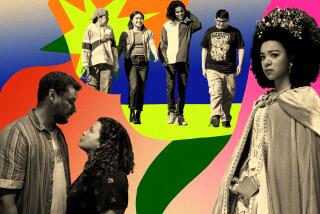Review: ‘Push Girls’ captures a beautiful reality
- Share via
The essential demands of creating a reality television series inevitably foil even the best intentions of capturing real life. And this being the entertainment industry, not everyone of course has the best intentions.
Situational shows, in which a group of carefully cast people is assembled and forced to interact as “friends,” are the worst offenders. They are often so scripted, manipulated and edited that the only thing separating them from nonreality shows is the level of acting and the union dues.
I say all this because every once in a great while a show comes along to remind us that reality television need not be defined by “The Real Housewives” or “Jersey Shore.” That, in fact, there are wonderful and valuable things the genre can do that scripted shows simply cannot.
“Push Girls” is one of those shows.
Airing Monday on the Sundance Channel, “Push Girls” chronicles the lives of four women who have spent most of their adult lives in wheelchairs. It follows them as they navigate careers, marriage, dating and the many obstacles of a still often less-than-accessible world.
All of them are articulate, energetic and genuinely inspiring. And they are also astonishingly beautiful, which is both encouraging — why shouldn’t women in wheelchairs be beautiful? — and slightly disturbing — would they be less interesting if they weren’t so lovely to look at?
But television is a visual medium, and one point the show makes with breathtaking rapidity is that tragedy can interrupt even the most seemingly charmed life. The other, more important point is that it can be just that — an interruption rather than an off-the-rails ending.
“If I can’t stand up, I’m going to stand out,” says one of the women toward the end of the pilot, and that would appear to be its theme.
Where others might have chosen to follow the overtly emotional, “The Other Side of the Mountain”-type story line of agonizing transition from able-bodied to physically challenged, this show does not. Instead, it chooses women who have been in their chairs for at least 10 years — which shows in the grace and ease with which they operate their chairs and perform tasks that, to the able-bodied, would seem impossible without full mobility.
Angela, a former model and activist, is the most physically beset of the four; a car accident left her a quadriplegic with limited use of her torso and arms. The only one who requires a full-time nurse, she recently separated from her husband and is now trying to revive her modeling career to pay the bills.
Her roommate, Tiphany, a self-defined flirt, has also just broken up with her boyfriend and is now exploring the possibility of a relationship with a woman. A competitive swimmer until an illness left her paralyzed at 15, Mia is feeling a bit confined by her own relationship and hoping to return to the water after all these years.
Auti, a former rapper/hip hop dancer, is wondering if, at 42, there is time for her and her husband to have a baby together. A fifth woman, Chelsie, who was also injured in a car accident, joins the group in later episodes.
The structure of “Push Girls” is similar to many reality shows — scenes of interactions are followed by “offstage” interviews in which the women describe what they’re feeling about the various “plots,” which, as is standard of the genre, unfold in a carefully curated manner. What sets “Push Girls” apart is that these plots, and these women, are actually interesting.
They don’t need to get drunk and overturn tables or engage in petty backbiting and histrionic reconciliations; “normal” life is quite challenging enough without all the absurd theatrics.
And it’s not just the sight of Tiphany bumping her chair down a staircase at a club or Angela putting on makeup without the use of her fingers that rocks you back in your seat. Admirable, but not saintly, these women offer an antidote to much of what passes for entertainment in reality television: A better, rather than worse, version of our selves.
No one can control the vagaries of fate, and many of us face troubles that threaten to undermine whatever strength and talent we possess. Denied the use of their feet and legs, these women have taken their futures quite literally into their own hands. Watching them, there seems to be no reason why the rest of us cannot do the same.
More to Read
The biggest entertainment stories
Get our big stories about Hollywood, film, television, music, arts, culture and more right in your inbox as soon as they publish.
You may occasionally receive promotional content from the Los Angeles Times.











